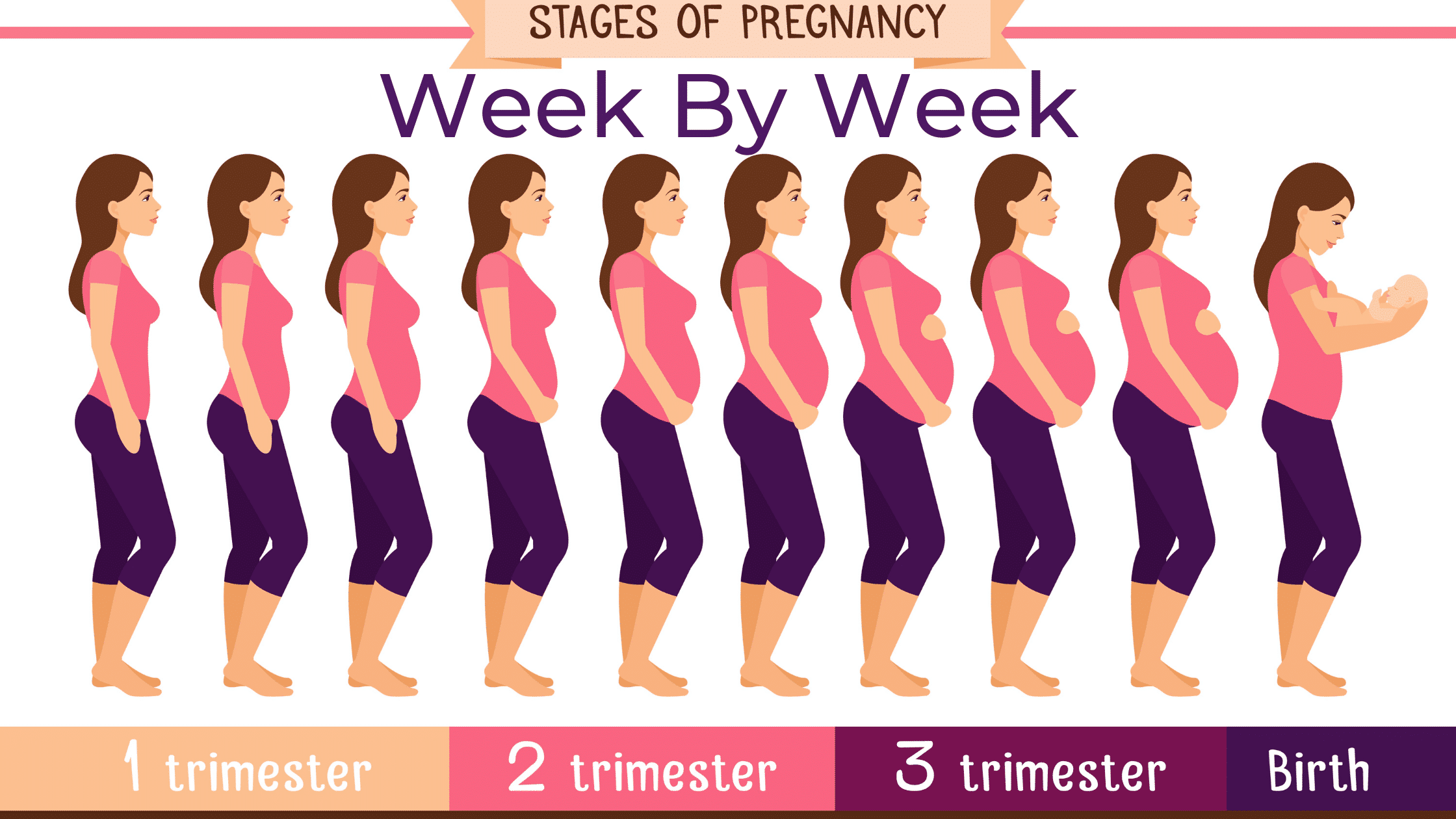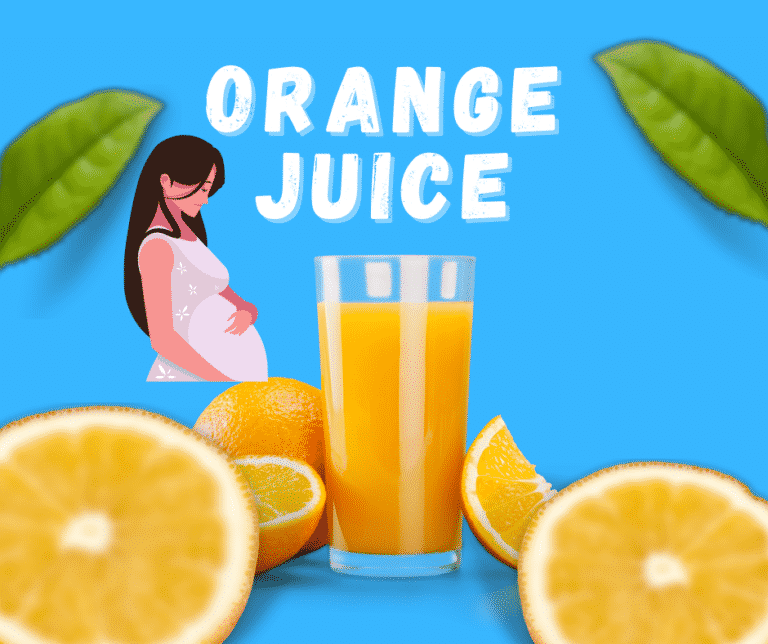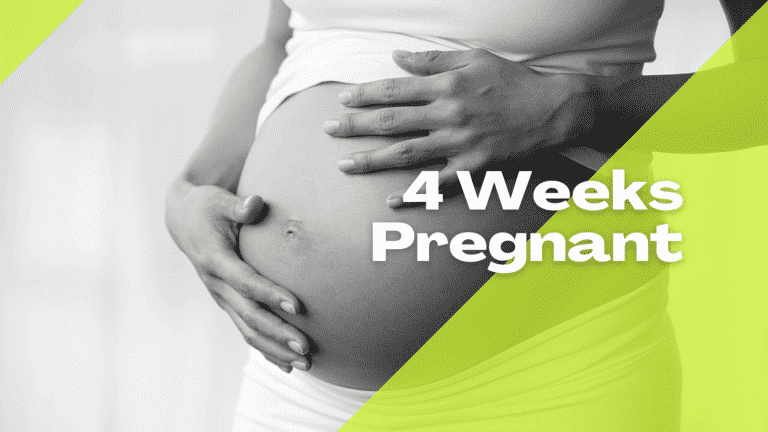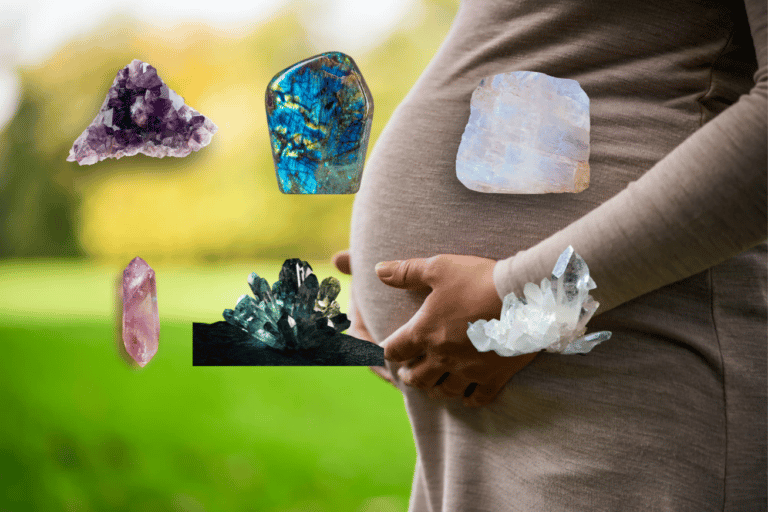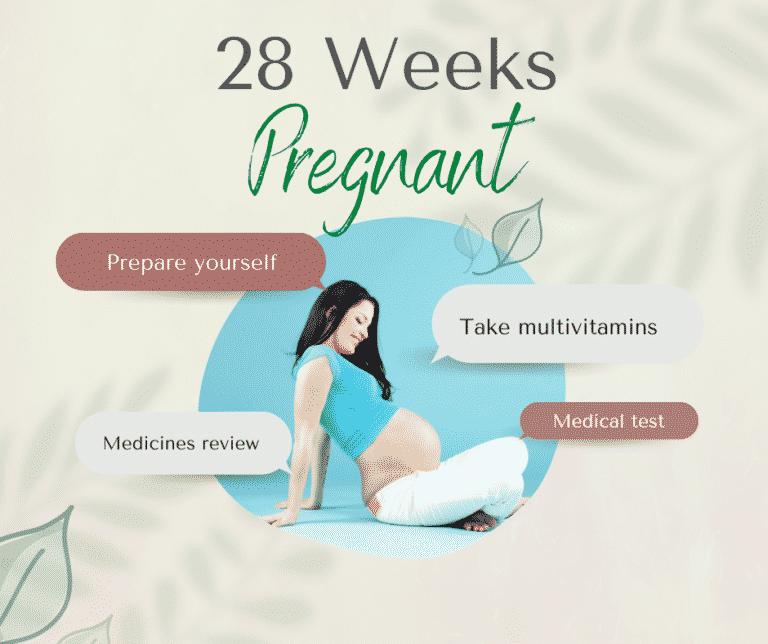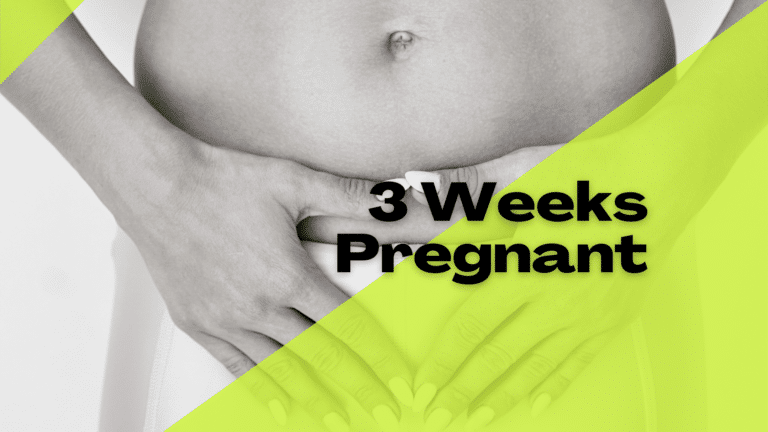Pregnancy Week By Week
Published on February 13, 2022 – Last Updated on November 27, 2023
Congratulations on your pregnancy! We know that you are anxious to find out details about each step of your pregnancy; that’s why we have created this pregnancy week-by-week post where you can view the baby’s development and what happens to your body during each week.
That’s right, and pregnancy is a huge life change! And we’re here to help you make sense of it all in this week-by-week guide for pregnancy. From what’s happening with your growing baby and changes that occur during each trimester until the delivery day, our posts will give insight into everything related to pregnancy from A-Z.
First Trimester of Pregnancy
Your baby is not just an embryo at the beginning but two layers of cells that will eventually evolve into all the organs and body parts. Growing quickly in this stage, your budding son or daughter may be about as big around as a kidney bean – constantly moving too!
The heart beats fast while it forms almost everything else: earlobes, eyelids, mouth, nose, etcetera; you’re sure to notice his/her emerging cute features such as fingers, hands, feet above the ankles stubby little toes.
On this page, you will find fetal development photos, lots of articles about pregnancy, and amazing instruments like our week-by-week ultrasounds or Due Date Calculator. Whether you’re a first-time mom, our free hypnobirthing app is your go-to for a calm pregnancy. Connect with other parents with our pregnancy apps.
All you need to know for each stage of pregnancy
1 Week Pregnant
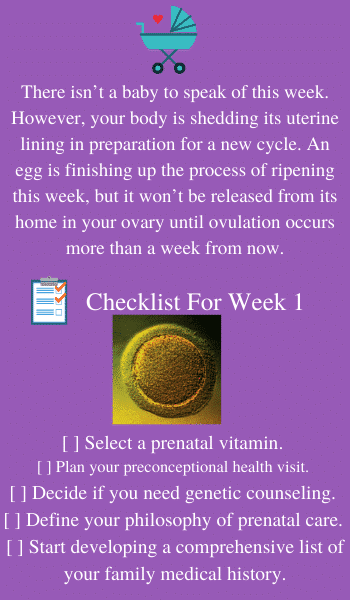
Since the first week of pregnancy, the uterus has been preparing for the appearance of the fertilized egg. Actually, there is no baby yet. The conception date is assumed to be two weeks after the last day of your last menstrual period.
Doctors and nurses use the first day of your last menstrual period (LMP) to know when you’re pregnant. This is because it’s about 280 days long, or 40 weeks from fertilization.
2 Weeks Pregnant
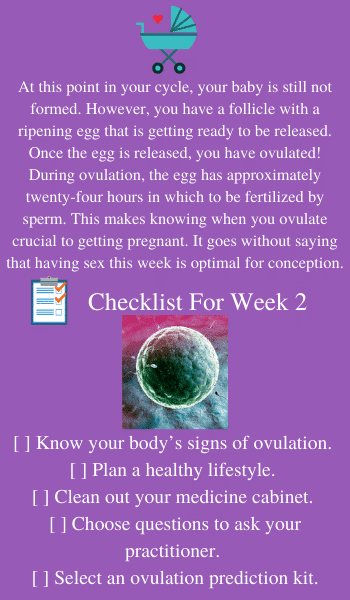
The anticipation for ovulation is building, and you may notice that your vaginal secretions are wetter than usual. It’s also possible to feel pain at this stage in our menstrual cycle! You’re about to embark on one of the most exciting weeks in your life! This is where it all happens: You’ll ovulate, and if the egg meets sperm, then a baby bump will be inevitable.
3 Weeks Pregnant
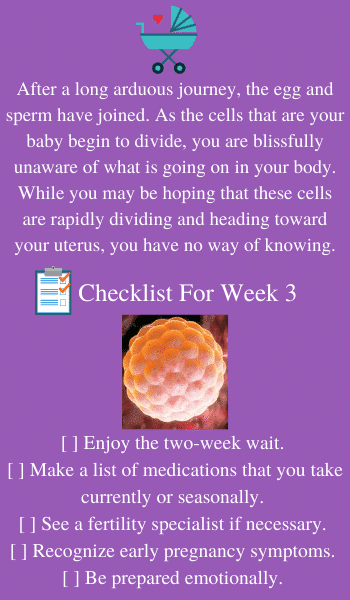
The two gametes (sperm and egg) and their cell membranes have aligned so that they can interact. This process is known as “fusion.” The resulting single-cell organisms are called blastocyst hatchers—the beginning stages of developing an embryo!
The blastocyst will travel to your uterus and stick to your uterine wall.
4 Weeks Pregnant
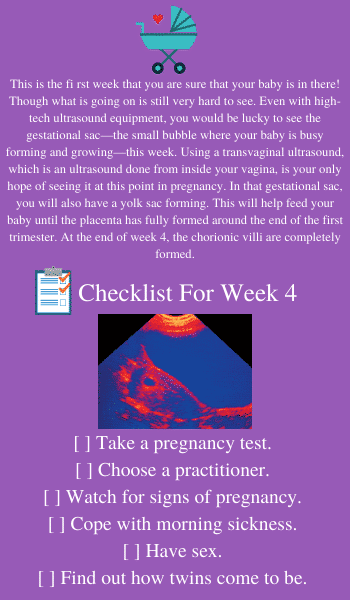
Your embryo will split in two this week, forming the placenta and your baby. Your embryo will also develop three coatings of cells that will develop into specialized aspects of your baby’s body.
You’re probably feeling pretty pregnant at this point! Your abdomen has started to grow and soften, with a changing texture of your cervix. You might experience some breakthrough bleeding as the fertilized egg embeds inline inside your uterus.
Pregnancy Week By Week
Pregnancy week by week is a pregnancy guide that helps pregnant women know what to expect during pregnancy. Of course, every pregnancy is different, but pregnancy week by week can give women a general idea of what to expect. The guide covers everything from pregnancy symptoms to fetal development to labor and delivery. Pregnancy week by week also includes information on prenatal care, nutrition, and exercise. Pregnant women can use pregnancy week by week to help plan for their pregnancy and feel more prepared for the changes that come with pregnancy.
5 Weeks Pregnant
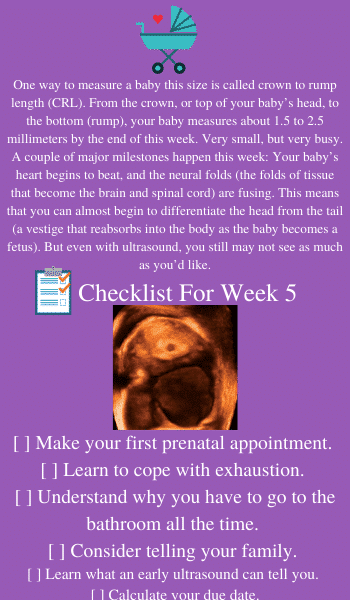
With each passing day, your baby’s growing body undergoes life-long changes. One of these is a dramatic increase in hormones that confirm pregnancy and activate the circulatory system early on its journey to maturity! As a result, there could be some discomfort during your pregnancy, including fatigue.
You should schedule a prenatal appointment. Then, it’s time for some serious changes. You should start by eating more healthily and stop smoking or drinking alcohol while pregnant for your baby’s safety.
6 Weeks Pregnant
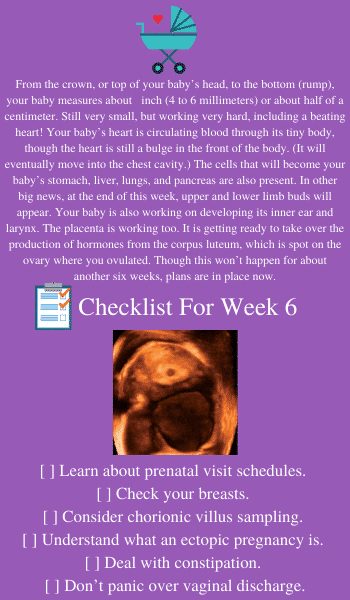
The baby measures anywhere from a fifth to a quarter of an inch. Your baby’s developing organs and senses are now more active than ever. You may experience morning sickness or spotting during this time, but don’t worry, as it is completely normal for new mothers to do so!
At around week six of the pregnancy, you may notice some changes in your breasts. This is due to the hormonal stimulation of the milk-producing glands.
We give you our free birth plan if you want to prepare for labor and birth.
7 Weeks Pregnant
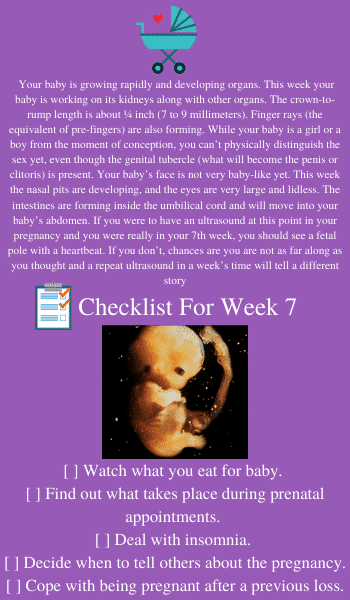
The baby is around a quarter of an inch in length now. By seven weeks pregnant, your baby’s brain is growing rapidly (new brain cells are developing at the speed of 100 per minute), and arm, mouth, tongue, and leg buds are starting to form.
Your heart rate rises steeply, and your metabolic rate increases up to 25 percent.
8 Weeks Pregnant
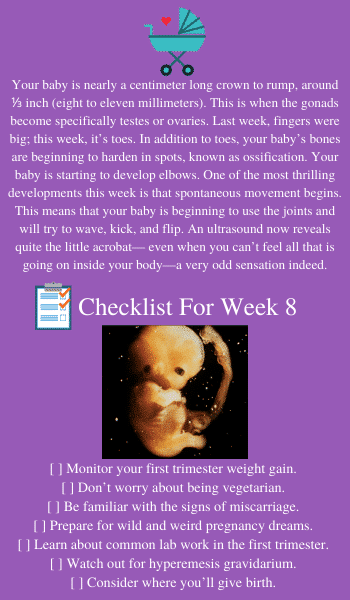
The baby is growing and changing every day, and you can see some of the changes taking place. For example, the baby’s heart is beating faster than an adult’s, and he or she is making random movements.
The first prenatal appointment will be scheduled between now and week 10. In addition to various tests, you’ll get a “dating” scan (ideally conducted between 13 weeks) that confirms the baby’s due date and check on his health!
9 Weeks Pregnant
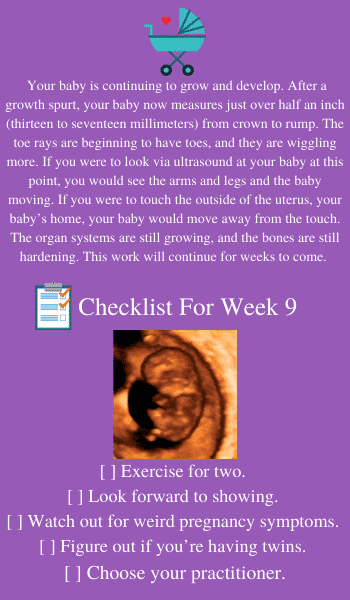
The baby’s ears are now much more prominent as well! You can feel those new movements happening inside of you grow stronger, too – it’s almost like they’re fighting back against their restrictive environment (which isn’t really possible). The sound of your baby’s heartbeat can be heard with a Doppler.
10 Weeks Pregnant
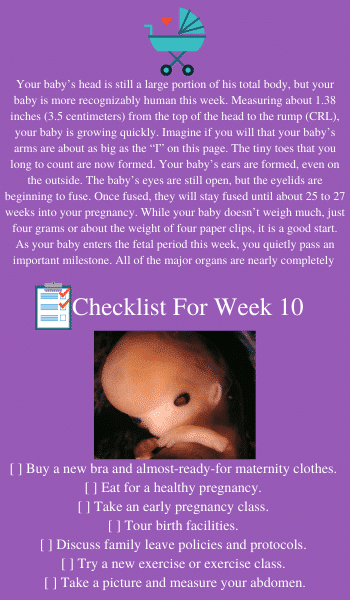
From an embryo to a fully-developed fetus, your baby is developing fast! The bones and cartilage form while their knees and ankles shape up. The teeth are starting to form under the gums as well.
You may find yourself getting more irritable than usual. Of course, this is due to hormonal changes. Still, it can be exacerbated by natural anxieties about pregnancy and motherhood- especially since your hands and feet will probably start feeling warmer as well! You might also notice that you’re thirstier; this means the body needs extra fluids, so drink up!
11 Weeks Pregnant
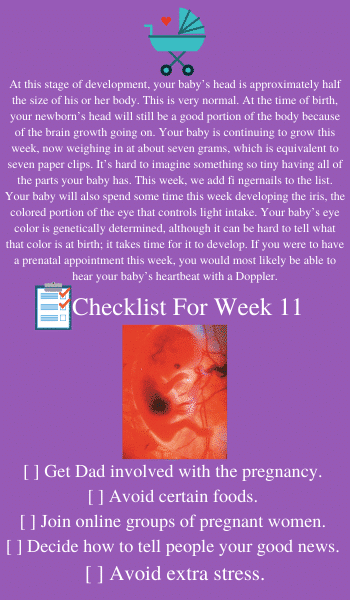
The baby is about two inches long this week and weighs an ounce. In addition, they have human characteristics such as hands, feet, ears, and open nasal passages.
You should perform an ultrasound this week as it will give your EDD within three to five days, help screen for Down syndrome, and detect whether you’re carrying twins. Normal weight gain has been around 2¼ lbs so far in pregnancy; however, some women actually lose weight in the first trimester if they suffer from nausea – but don’t worry because it’s expected that all pregnant ladies experience these changes during their pregnancies too!
12 Weeks Pregnant
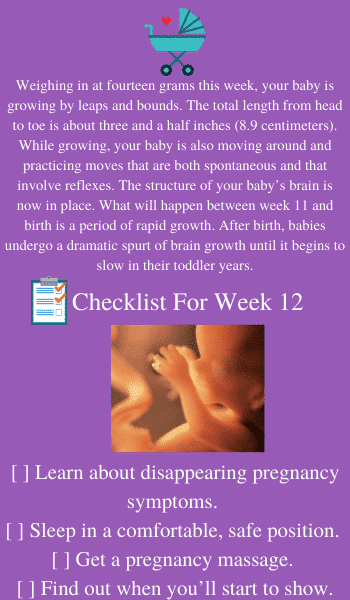
The digestive system matures as it produces contractions in this stage, but you will finally hear their first heartbeats soon!
One may be offered a CVS test if they are 35 or older, had an abnormal 1st-trimester screen, or have a family history of cystic fibrosis. A person who has been in morning sickness should start feeling better now as their baby’s nervous system is fully developed. They can stop taking the folic acid supplement.
Second Trimester of Pregnancy
A Baby’s second trimester starts when babies weigh just over a pound. They’re also beginning to develop their fingerprints now and hear the sounds around them! You may notice that your baby has started kicking or fluttering soon if you haven’t felt these movements already.
This can be a little startling, but you’ll get used to it soon enough! If your baby is like the majority of babies, they will start moving on their own around 20 weeks. A mother’s heartbeat and voice are also familiar sounds that your fetus hears while in utero, which helps develop his or her sense of hearing and voice box.
Want to have a calm and relaxed pregnancy? Check out our hypnobirthing techniques post, where we discuss the method of hypnobirthing.
It could also be a good idea to start timing and tracking your contractions. Read more about: how to time contractions, contraction app & best contraction timer app.
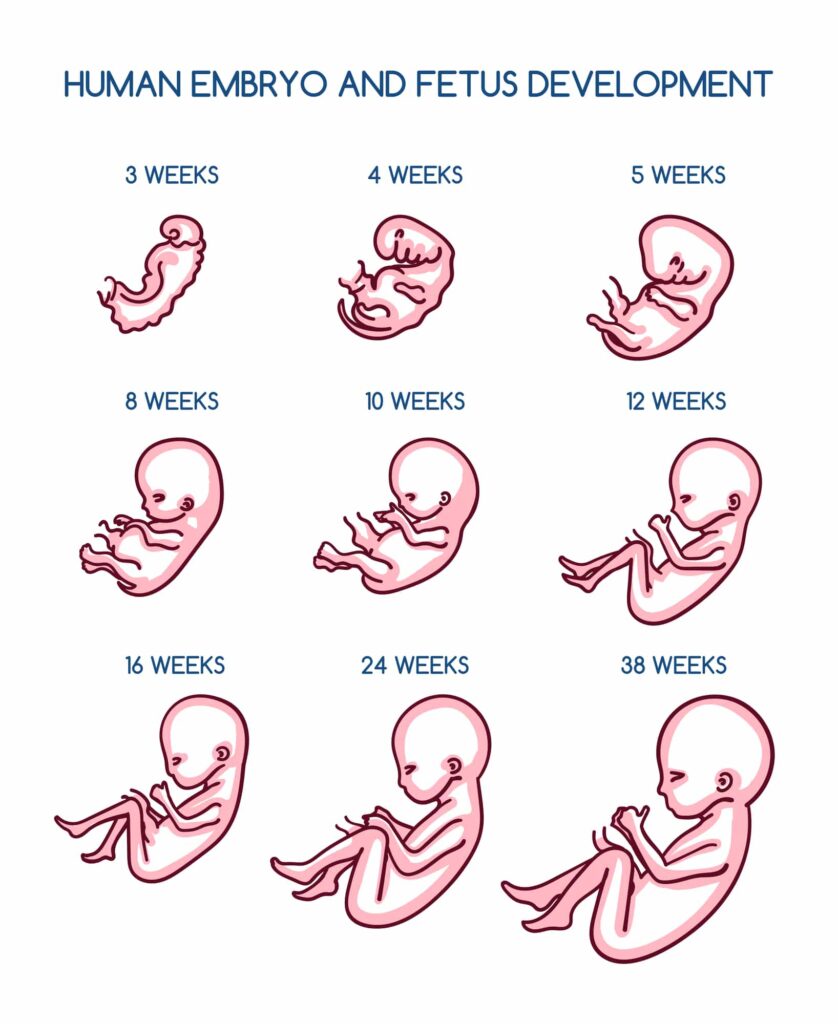
13 Weeks Pregnant
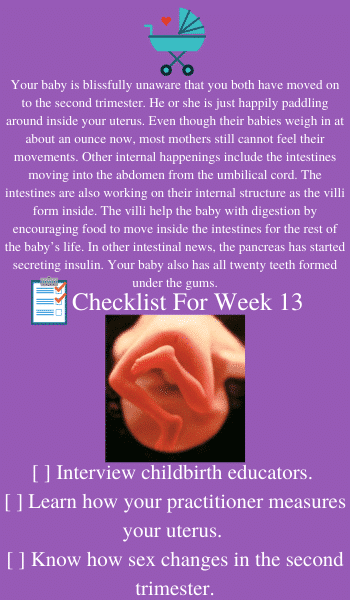
This is the last week of the first trimester. Babies begin growing at different paces at this stage. The intestines are also in for significant changes, moving towards the baby’s abdomen. In addition, the placenta is developing this week to serve the growing baby’s needs.
You will continue to gain weight and may start to feel better. You will likely gain about 12 pounds this trimester, 2 of which will be due to your baby.
14 Weeks Pregnant
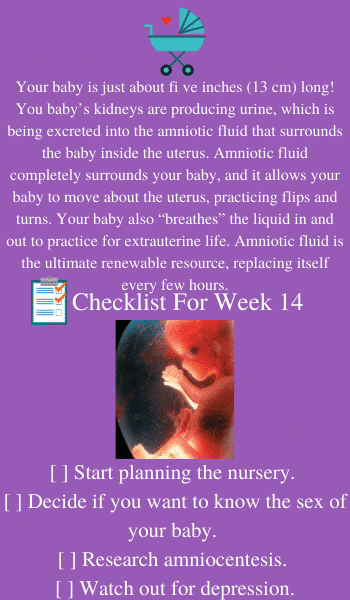
Have you been suffering from constipation at this stage? The most likely cause is increasing progesterone levels, which slows down the muscles in your intestine and makes it difficult for waste materials to pass through. You can solve this by drinking more water or eating fruits high in fiber content, such as prunes. However, if that doesn’t work, I recommend seeing a doctor who may offer other solutions too!
Pregnancy Stages Week by Week
Pregnancy is typically divided into three stages, each lasting around 13 weeks. The first stage, known as the first trimester, is the most crucial time in development. The baby’s brain, spinal cord, heart, and other organs begin to form during this time.
The second stage, called the second trimester, is when the baby’s bones, muscles, and reproductive organs develop. This is also when pregnancy symptoms, such as nausea and fatigue, typically start to dissipate.
The third stage, called the third trimester, is when the baby grows and puts on weight. This can be difficult for many women to experience increased back pain and Braxton Hicks contractions. However, it is also an exciting time as they prepare for the arrival of their new baby.
Pregnancy is a fantastic time in a woman’s life, but it can also be challenging. Therefore, it is essential to stay healthy and informed throughout the entire process. Using the pregnancy stages by week will find all the necessary information about yourself and the baby.
15 Weeks Pregnant
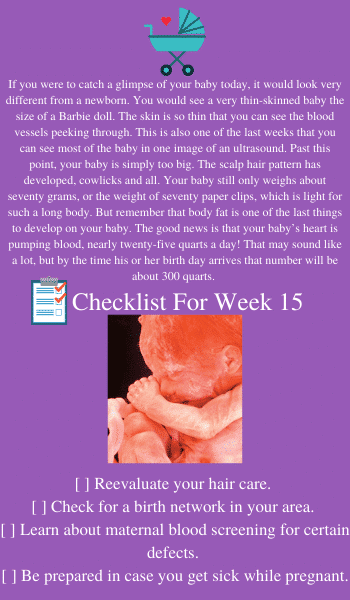
Several changes and developments are happening with your baby at this stage of the pregnancy. It would be best if you started preparing for maternity clothes. You will also be offered to screen for Down syndrome and neural tube defects soon. Amniocentesis is the best option for ensuring that your baby doesn’t have any severe disorders.
16 Weeks Pregnant
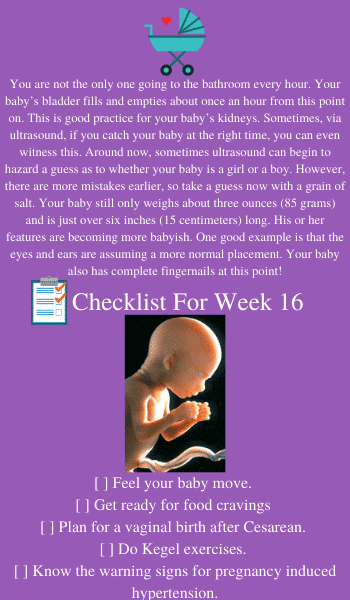
During the prenatal period, it is essential to attend regular check-ups. Growth spurts will occur during this time, so your baby will rapidly gain weight and height. You may be prescribed an iron supplement if you are anemic.
17 Weeks Pregnant
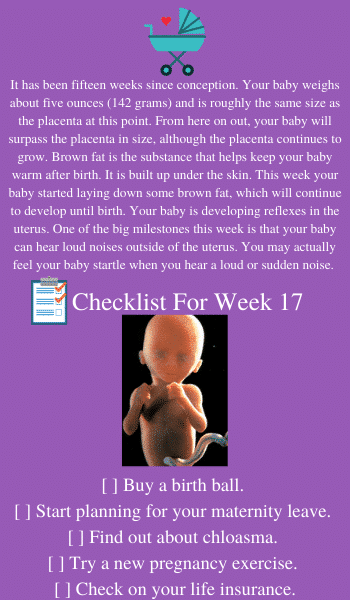
You may feel your baby move if you’ve had a previous pregnancy. At the same time, you may also notice that your belly isn’t as hard as it was the first time around. Most of us are probably aware that this is because our abdominal muscles have separated to accommodate the growing baby.
18 Weeks Pregnant
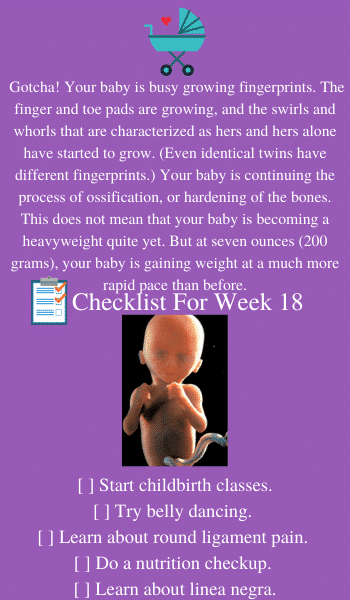
The second trimester is when you’ll be able to see your baby’s genitals. You may experience a resumption of normal energy levels and increased libido, which can make for some great lovemaking!
19 Weeks Pregnant
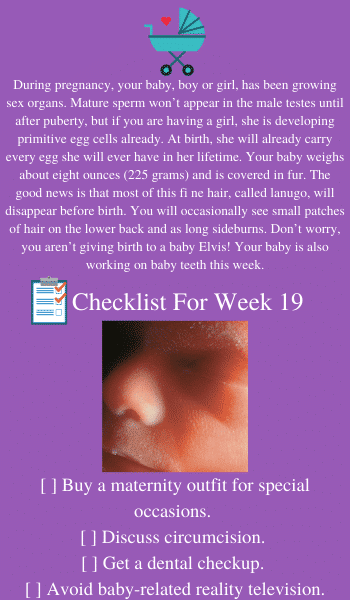
The baby can hear you and the surroundings. In addition, your increased metabolism, blood supply (which helps with healthy nails), and a few women’s higher estrogen levels mean that they develop chloasma patches of dark skin on their face.
20 Weeks Pregnant
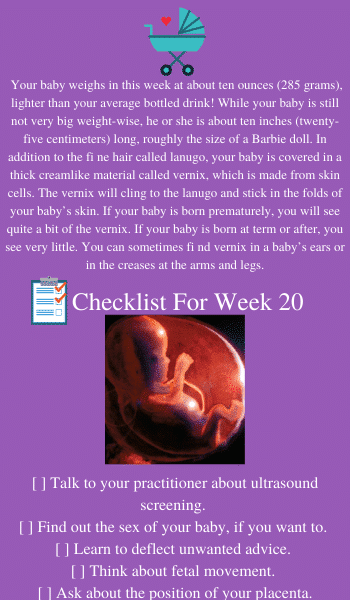
You will likely have a prenatal appointment at this time. Your baby’s heartbeat will be listened to at this appointment, and your abdomen will be measured to check fetal growth. You may also feel your baby move at this point if it is your first baby. Additionally, blood pressure and signs of preeclampsia will be checked. The baby, at this point, is trying to find his/her best position. The umbilical cord might get in the way, so keep it wrapped around your abdomen until you are ready for delivery. Keep an eye on it!
21 Weeks Pregnant
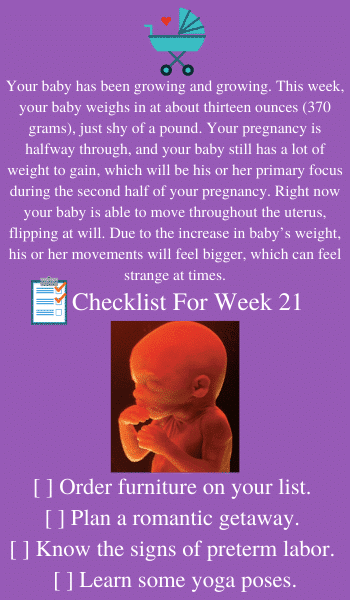
It’s a shame that you can’t see your baby at this stage of pregnancy because it is so fun for both parent and child. In addition, the pregnant mother will often feel more hot flashes, which could be due to carrying around extra weight or increased activity from her growing bump! She might also find herself sweating during these later stages even if she doesn’t have a fever due to the increase of certain hormones in her body.
22 Weeks Pregnant
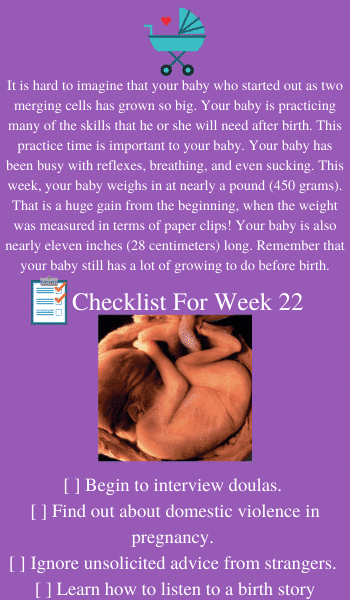
The body is preparing for the arrival of the baby. For example, colostrum, the baby’s first food, may start leaking from the breasts. In addition, the nipples may start getting bumps called Montgomery’s tubercles which produce a moisturizing substance to protect them while breastfeeding.
23 Weeks Pregnant
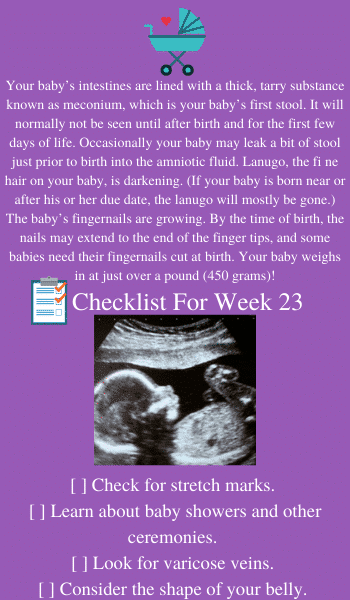
Swelling in the ankles and feet, heartburn, and indigestion are common occurrences during pregnancy. Eating several small snacks instead of two or three large meals, taking a walk after meals, and drinking plenty of fluids can help ease these discomforts.
24 Weeks Pregnant
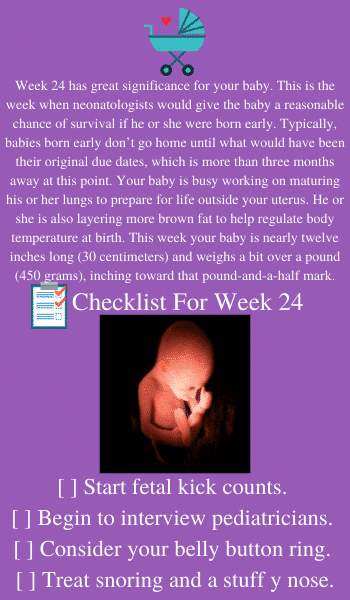
Your baby is growing more significant at this stage in your pregnancy, and you’ll likely have a check-up to ensure that they’re healthy. You may also want to start practicing Kegel exercises to help prepare your body for labor.
25 Weeks Pregnant
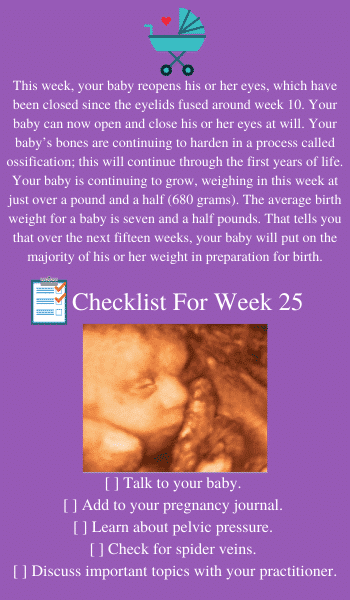
The extra weight has given rise to backaches or discomfort in the pelvic region. Rest would help relieve this pain while also allowing yourself time for some self-care by getting tested at week 28 (or earlier); You can check if glucose levels were high before now.
She may have some discomfort, although she may also feel just fine. What’s more important is that the baby has been getting bigger and stronger over the past month or so. Her lungs are fully developed and ready to function on their own once she leaves the comfort of her mother’s womb and enters a world where every new breath is one of life’s most incredible adventures!
26 Weeks Pregnant
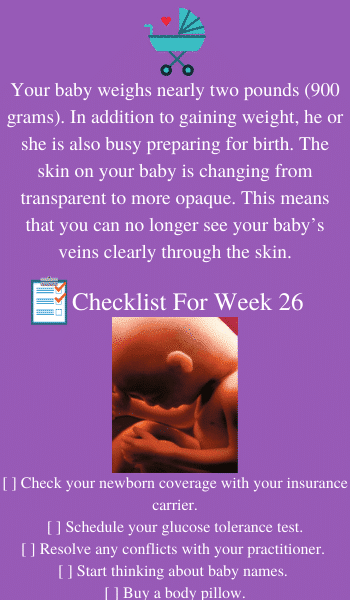
Stretch marks may start to appear around now, usually on your tummy and breasts. If you are taking maternity leave, inform your employer in writing. Check the rights and benefits to which you are entitled.
27 Weeks Pregnant
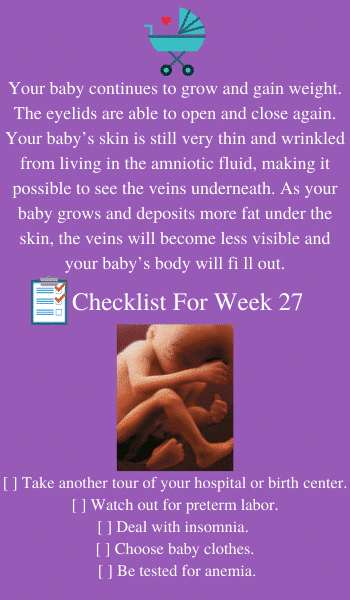
The second trimester is when you might start hearing your baby’s hiccups for the first time. In addition, your abdomen will now be more prominent, though it depends on factors like height and weight and whether pregnancy has been experienced before or not!
Third Trimester of Pregnancy
During the third trimester, babies grow like weeds, gaining about a pound every day. They can now blink their eyes and have lashes on them! The skin is starting to smooth out as well. It looks more youthful, but it also provides protection for those new bones underneath (that’s why you’ll notice these little nuances like fingernails or toe webs). Your baby will continue putting weight onto himself until he reaches full term.
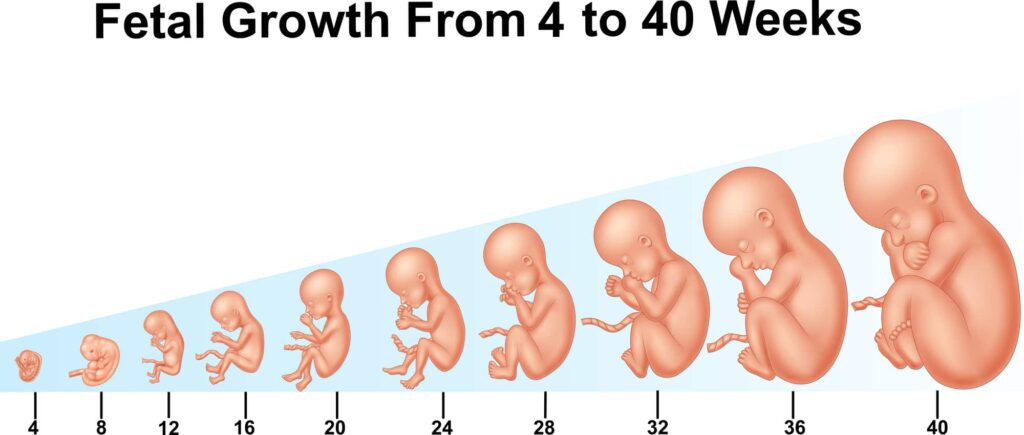
28 Weeks Pregnant
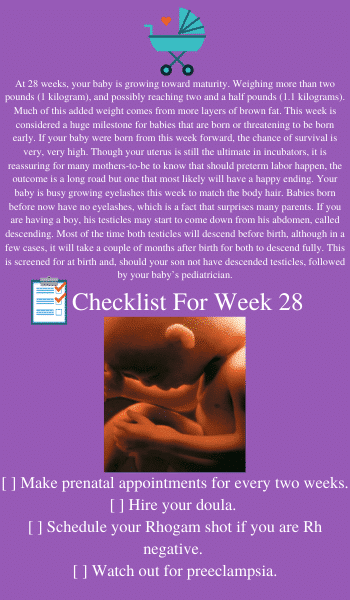
Blood pressure and preeclampsia check are also done at the prenatal visit. The baby’s heartbeat is listened for, and the abdomen is measured to check fetal growth. If the mother is rhesus negative, she will be given her first anti-D treatment. Between now and week 38, the mother may want to have the whooping cough vaccine. Book your childbirth classes now to meet with the people who will help make this significant moment in life go smoothly.
29 Weeks Pregnant
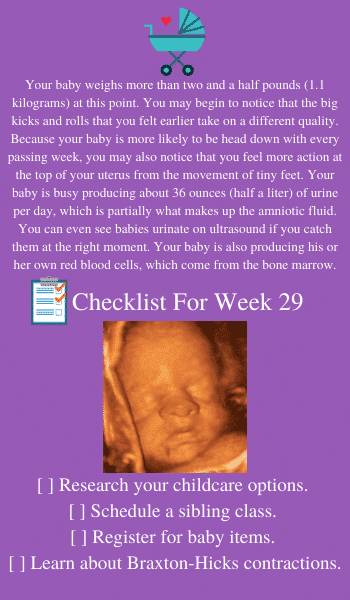
The baby’s body grows and develops, with the lungs growing and the head growing in size to create space for the brain. The uterus has grown approximately 1½ inches and is now pushing up against the bottom of the ribcage, which can cause discomfort. Sometimes pressure on the veins that take blood from the legs to the heart can cause varicose veins.
30 Weeks Pregnant
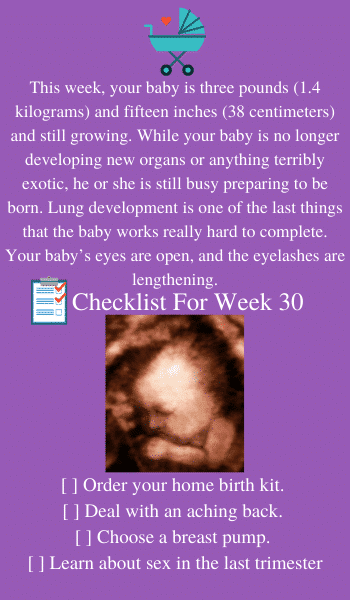
Now that your baby is getting heavier, you can discuss any concerns you have about the birth with your doctor. They will measure your blood pressure, check for preeclampsia, listen for the baby’s heartbeat, and measure your abdomen to check fetal growth.
Belly Stages of Pregnancy Week By Week
There are three main belly stages of pregnancy: the first stage, when the belly is just beginning to grow; the second stage, when the belly is more significant and more noticeable; and the third stage when the belly is at its maximum size. Each phase lasts for approximately four weeks.
During the first stage, many women report feeling their clothes becoming tighter around their waist. This is due to the fact that the uterus expands as the baby grows. Additionally, some women may notice that their belly button begins to protrude during this stage.
The second stage of pregnancy is often when the belly really starts to show. The uterus grows, and many women begin to feel discomfort as their belly stretches. Additionally, the breasts may become larger and more tender during this stage.
The third and final stage of pregnancy is when the belly is at its largest. The baby continues to grow, and the mother may feel uncomfortable as her body adjusts to the new weight. Additionally, Braxton Hicks contractions, or false labor pains, may begin during this stage.
Understanding the different pregnancy stages can help women better prepare for the months ahead.
31 Weeks Pregnant
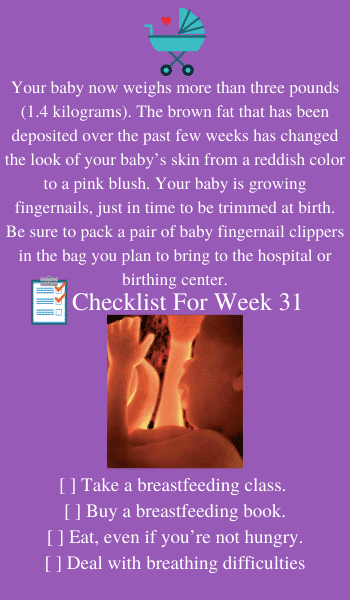
You may be experiencing insomnia, sleepiness, or fatigue. Your tailbone pain could also worsen near the end of pregnancy because your body is fighting against labor contractions and fulfilling its final duty to carry this baby into the world! At this point, you should learn more about Braxton Hicks’s contractions, and you could use a contraction app.
32 Weeks Pregnant
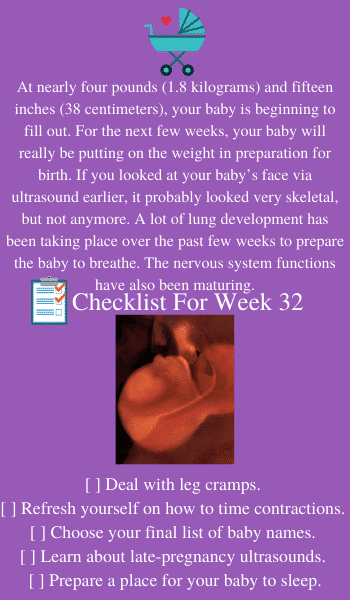
As your pregnancy progresses, you will continue to put on weight. Your uterus is also approaching its highest position, about 5 inches above your navel. This can cause heartburn and other symptoms. The baby is also plumping up!
33 Weeks Pregnant
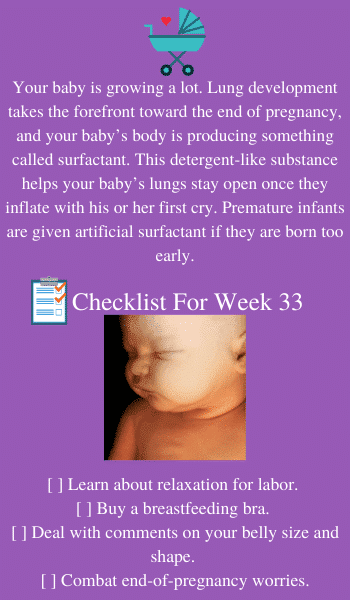
The baby continues to grow and develop in the womb. The baby is now approximately 4 pounds and has moved into the head-down position. This position will make delivery more manageable and also improve breathing and digestion.
34 Weeks Pregnant
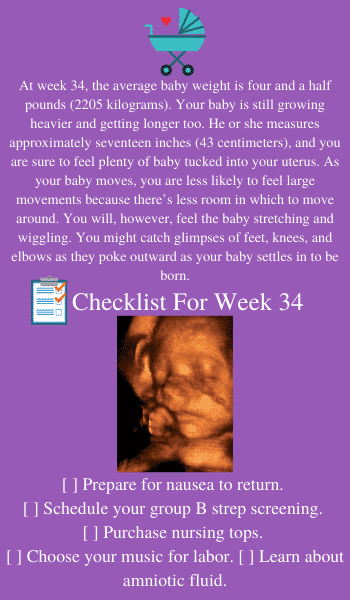
The body is preparing for the birth process by developing the baby’s nervous system and other organs. This may cause fatigue and dizziness in the mother. If the rings on your hand feel tight or your feet and hands are swollen, this is due to fluid retention. It can be made worse if tight clothing restricts your blood flow.
35 Weeks Pregnant
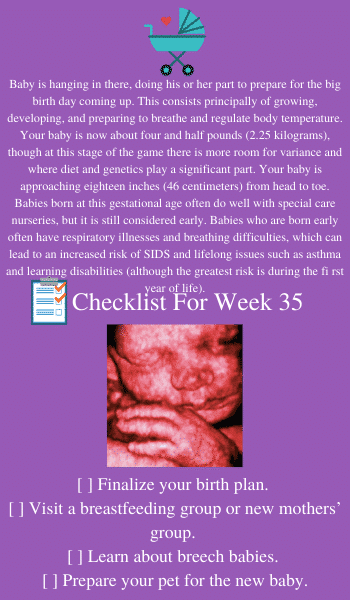
The hormones released during pregnancy (Relaxin) can cause the pelvis to loosen and the joints to expand. This is so that the mother can give birth more easily. As a result, you may experience some pain in this area, but it is normal and will go away after the baby is born.
36 Weeks Pregnant
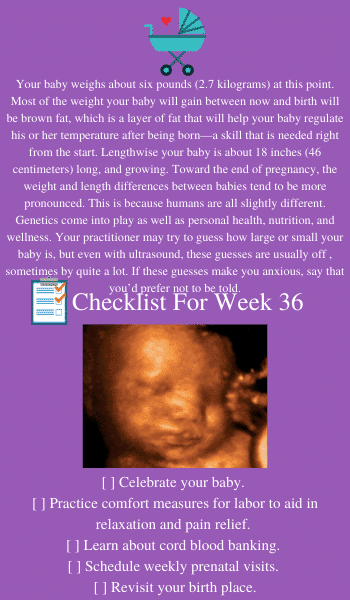
You will have several tests done, including checking blood pressure and preeclampsia, listening for the baby’s heartbeat, and measuring your abdomen to check fetal growth. A Group B strep test may also be conducted at this time.
37 Weeks Pregnant
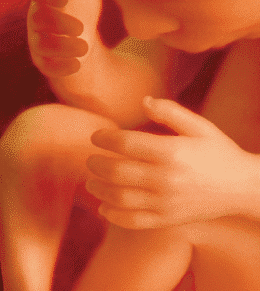
Your doctor will check on the health of you and your baby, including a pregnancy test. In addition, they’ll listen for amniotic fluid to see if there are any problems with heartbeat or position concerning fetuses development before delivering them into this world as well assess how dilated estrogen is making things act differently down below!
38 Weeks Pregnant
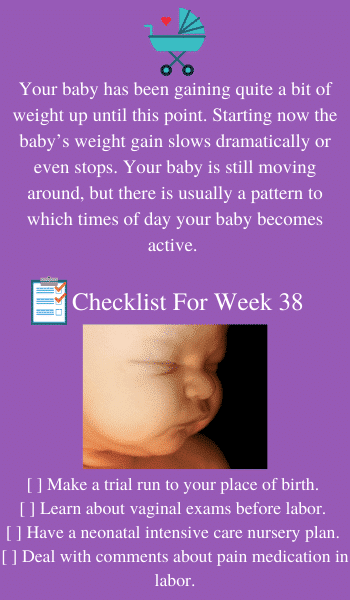
You may feel a mixture of emotions when you’re expecting, including anxiety about the impending birth and fatigue due to lack of sleep. Try talking through these feelings with your healthcare provider so that they can help dad out too!
39 Weeks Pregnant
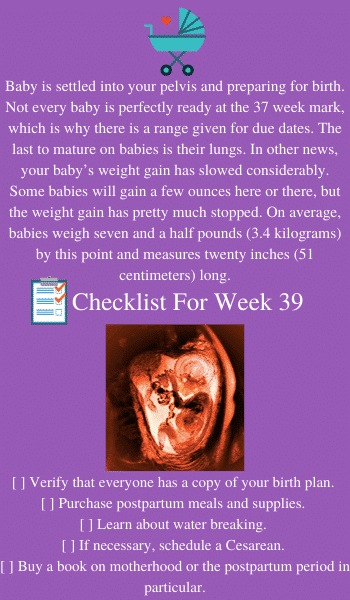
You may be feeling very uncomfortable. Your baby is due this week, and looking to say hi! If you notice any changes in your abdomen or back pain, call for medical help right away because it could mean that there’s been a breach of membranes, which would lead up to delivery soon enough. If waters break at all during my pregnancy, then I will definitely get checked out by our gynecologist but until then, let me know if anything pops up so we can take care on both ends.
40 Weeks Pregnant
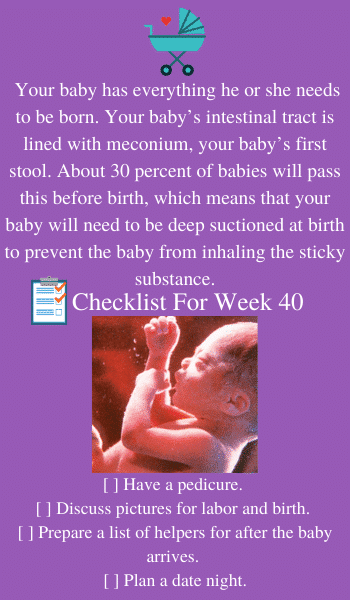
This is the week you are due to give birth, but only around 5% of babies are born exactly on their estimated delivery date. Nevertheless, the usual checks will be done if the baby hasn’t arrived yet, and options for inducing the delivery may be discussed.
41 Weeks Pregnant
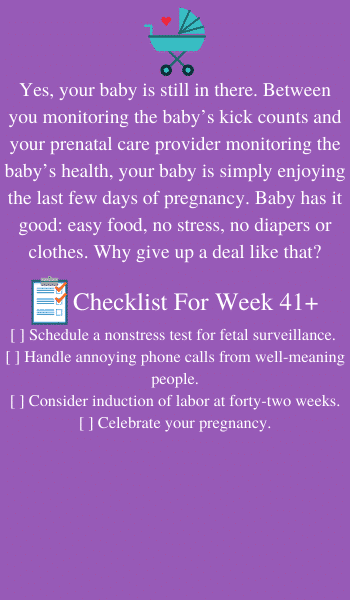
You and your baby have come to enter the world together. You’ll run into delivery or be induced soon, so everyone must be on their game! Your healthcare provider will examine how things are going with maternal positions next week at this same visit.
It is almost time to meet your baby!
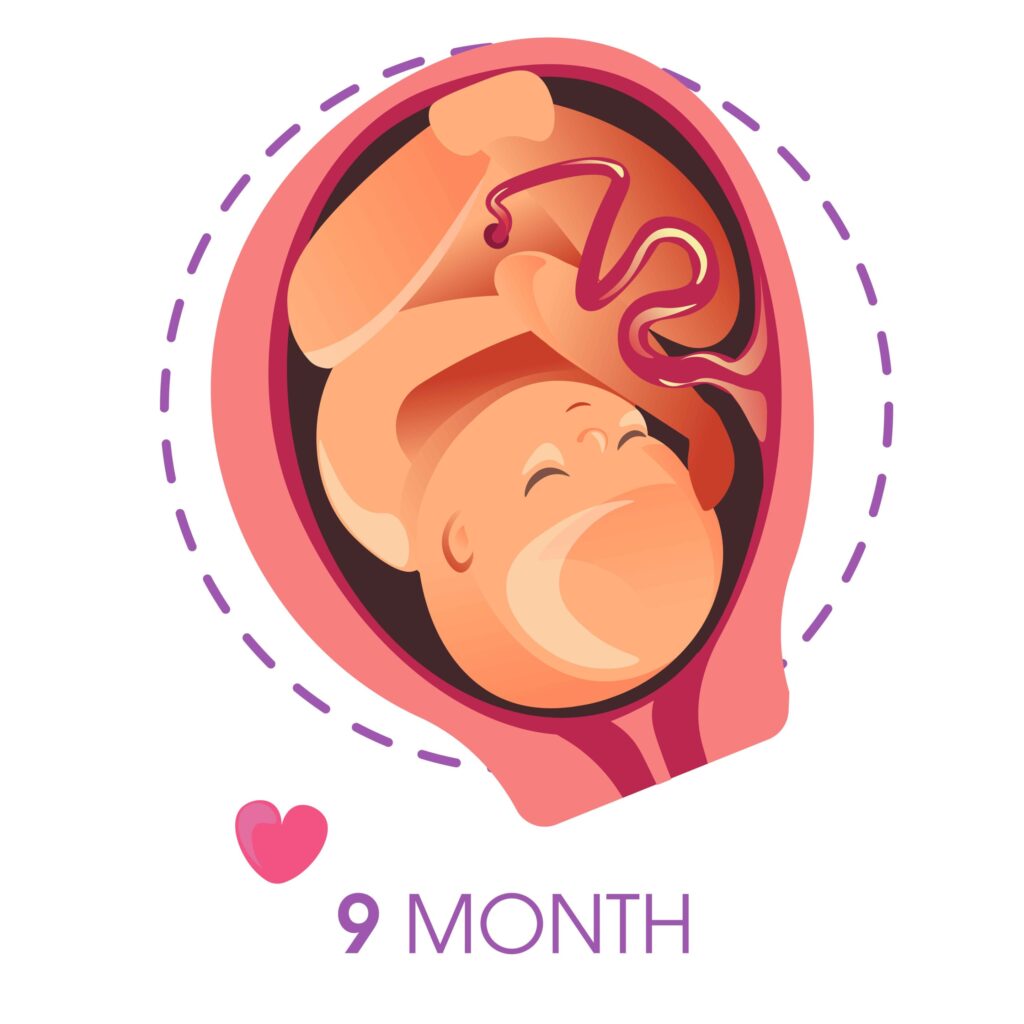
The final weeks of pregnancy are finally over, and you are past your due date. Although your baby’s birth might still be a few weeks away, it is good to start preparing for his arrival in the best way possible.
Preparing the home for your new baby is not something you will want to leave until later. However, the changes you make now can help set the stage for a smoother transition into parenthood, ensuring that setting up your nursery goes off without any hitches. You will also be teaching essential life lessons to your child right away by making sure his room reflects the structure of life that you want for him.
Congratulations on Your Baby!
We had the first, second, and third trimesters during pregnancy. So we all know what it is like to be pregnant, and we have a pretty good idea of what our baby looks like.
The baby’s growth (including baby sex, baby’s bones, and baby’s lungs) is now fully formed, and the expectant parents are now ready to meet the newborn.
The journey continues, and there are plenty of things to learn during the maternity period, and we are here to assist you.
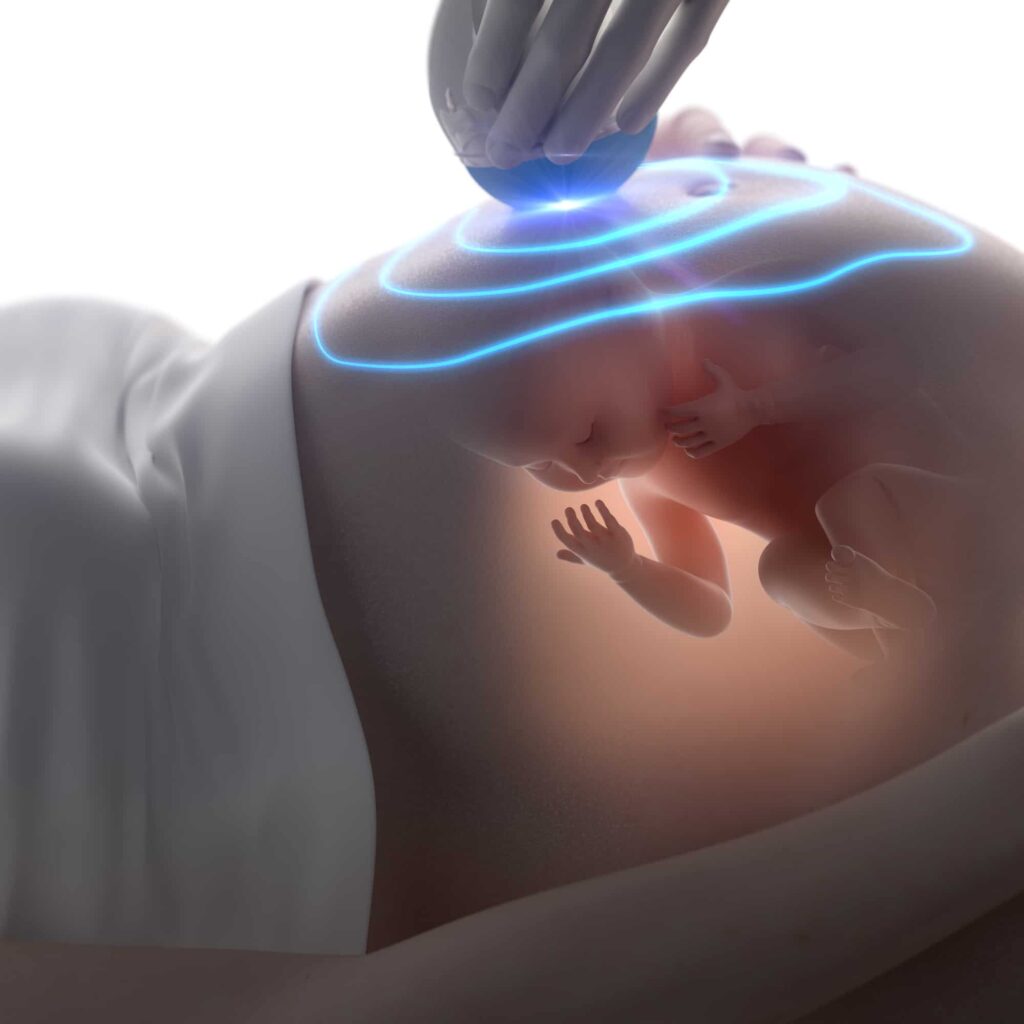
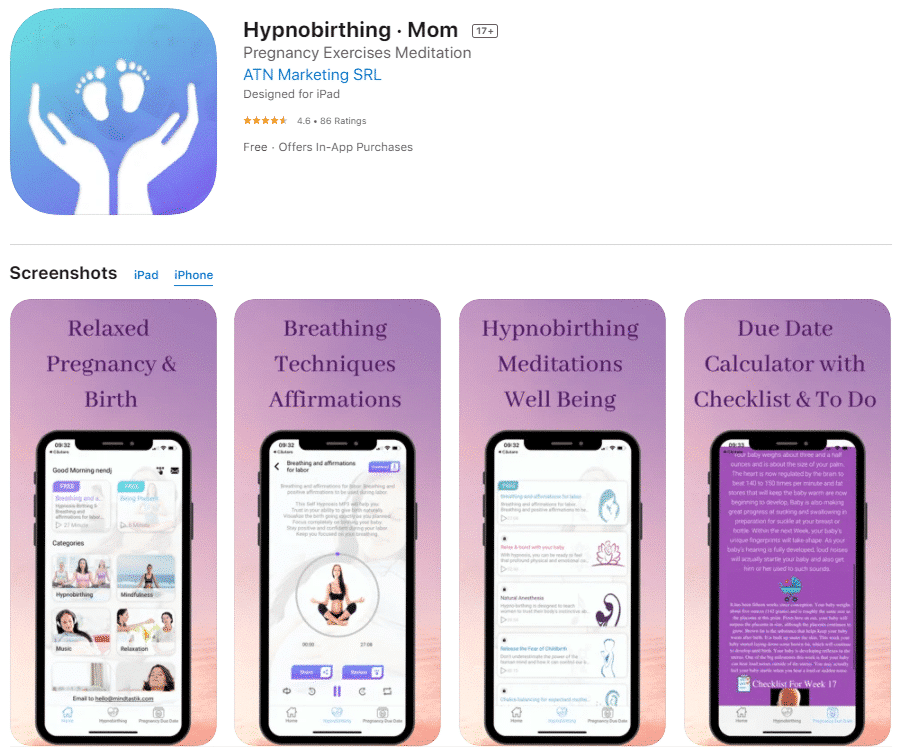
Frequently Asked Questions
What to expect in the next few weeks of pregnancy?
The next few weeks of pregnancy can be an exciting time as you watch your baby grow. You may start to feel the baby move, and you may begin to notice changes in your body. Here are some things to expect in the next few weeks of pregnancy:
- You may start to feel the baby move.
- Your belly may continue to grow.
- Expect to have more energy.
- You may have mood swings.
- You may start to feel Braxton Hicks’s contractions.
- Your doctor or midwife will likely check your baby’s heart rate and size at your next visit.
- You may want to start thinking about childbirth classes and picking a healthcare provider for your baby.
If you have any concerns, please talk to your doctor or midwife.
Is Everything OK with Baby’s Development?
When it comes to your baby’s development, everything may seem OK at first. However, there are some things you should look for that could indicate a problem. Here are some signs that something may be wrong with your baby’s growth:
- Your baby isn’t hitting developmental milestones. If your baby isn’t reaching certain milestones by the expected time, it may be a sign that something is wrong.
- The baby isn’t babbling or making other noises. Babies typically start to make noise around 3 or 4 months old. If your baby isn’t doing this by six months old, it could be a sign of a problem.
- Your baby isn’t trying to communicate. Babies typically start trying to communicate with gestures and sounds around six months old. If your baby isn’t doing this by 8 or 9 months old, it could be a sign of a problem.
- The baby isn’t crawling or walking. Most babies crawl by 8 or 9 months old and walk by 12 or 13 months old. If your baby isn’t doing this, it could be a sign of a problem.
- Your baby seems to be in pain. If your baby frequently cries and doesn’t seem to be soothed by anything you do, it could signify that something is wrong.
What is the role of the fallopian tube?
The fallopian tubes play an essential role in the reproductive process. They transport the eggs from the ovaries to the uterus. They also help to transport sperm to the egg. If there is a problem with the fallopian tubes, it can be difficult for a woman to get pregnant.
What to expect in the first trimester?
The first trimester of pregnancy is critical for your baby’s development. This is because all of your baby’s major organs and body systems will begin to form. This includes the brain, which starts to develop very early in pregnancy. As a result, your baby’s brain will be almost fully formed by the end of the first trimester.
Your menstrual period will also stop during the first trimester. This is because the fertilized egg begins to secrete a hormone called hCG, which prevents your body from ovulating. You may experience light bleeding or spotting when your egg first implants in the uterus, but this is not considered a menstrual period.
The first trimester can be an exciting and overwhelming time. There are many changes taking place in your body, and you may have lots of questions. Be sure to talk to your healthcare provider if you have any concerns. They can help you understand what to expect and how to best care for yourself and your developing baby during this important time.
What to expect in the second trimester?
The second trimester is often considered the best trimester of pregnancy. This is because by the second trimester, most of the common discomforts of early pregnancy, such as morning sickness and fatigue, have dissipated. And as the belly continues to grow, many pregnant women begin to feel more social and connected to their baby.
However, there are a few things to be aware of during the second trimester. For example, the umbilical cord starts to form around week eight and can sometimes herniate through the navel. It is usually harmless and will resolve itself. Another common occurrence during the second trimester is called implantation bleeding, which occurs when the fertilized egg implants in the uterine wall.
This can cause light spotting or even heavier bleeding, but it is generally nothing to worry about. Finally, during weeks 18-22, the neural tube closes, and the baby’s brain and spinal cord start to develop. Again, second-trimester ultrasound can help to ensure that this process is proceeding normally. Overall, the second trimester is an exciting time of growth and development for both mother and baby.
What to expect in the third trimester?
The third trimester is the final stage of pregnancy, and it can be both exciting and daunting. On the one hand, you’re close to meeting your little one. On the other hand, you may be feeling uncomfortable and exhausted. Here’s a look at what to expect in the third trimester.
As your baby grows, you may feel more pressure on your bladder and lungs. This can make it difficult to breathe and sleep. You may also notice that your belly is getting bigger and heavier. This extra weight can cause back pain, leg cramps, and heartburn. Try to sleep on your side, wear comfortable clothes, and take short walks to ease discomfort.
You may also find yourself more emotional in the third trimester. This is due to hormones and stress. Be sure to talk to your partner or a friend if you feel overwhelmed. And don’t forget to give yourself some time to relax. Take a warm bath, read a book, or put your feet up.
The third trimester can be challenging, but it’s also an exciting time as you prepare for your baby’s arrival. However, you can make it to the finish line by being mindful of your feelings and taking care of yourself.
The Takeaways: Week By Week Pregnancy
Now that you’ve read our article on the different stages of pregnancy, we hope you feel more prepared and knowledgeable about what to expect each week. The week-by-week pregnancy guide above will give you a better understanding of the changes that occur during each stage of pregnancy.
Remember, these are just guidelines, and every woman’s experience is unique. If you have any questions or concerns, be sure to speak with your doctor. Congratulations on your growing family!
Tags: fallopian tubes, last period, three trimesters, week pregnancy, most babies, due date, baby grows, final weeks, week of pregnancy, parents to be, pregnancy week

